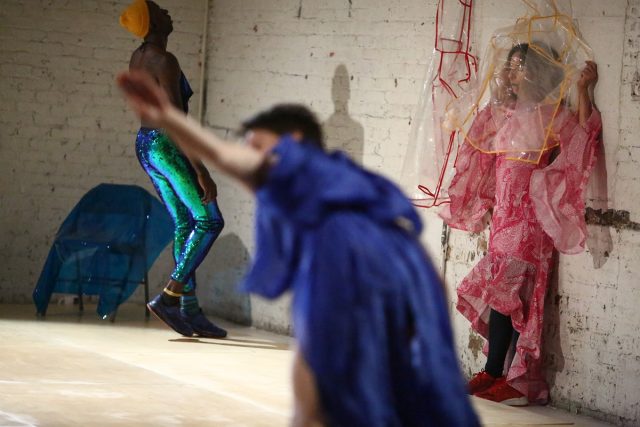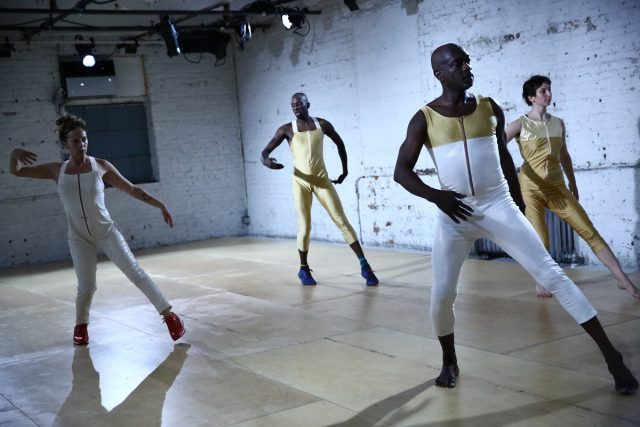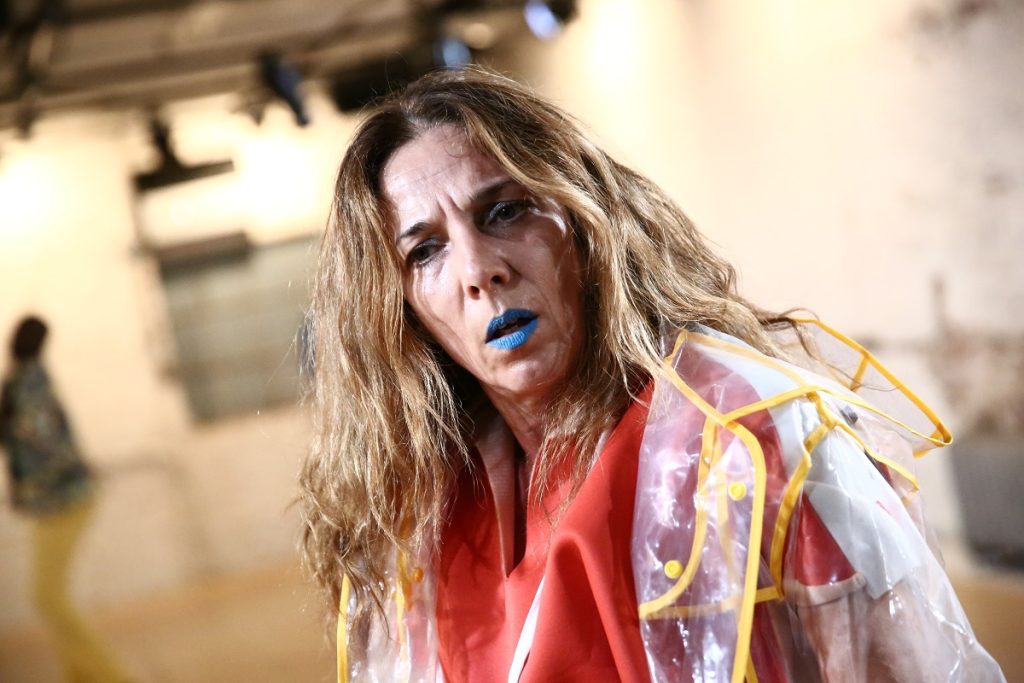Wearing neon blue lipstick and a sheer pink dress, dancer and choreographer Keely Garfield stands close to the audience at the start of her latest production, Perfect Piranha. “We’re all in it together,” she says, but the disjunction between that platitude and her bizarre outfit and threatening proximity to the audience signal that the performance to come may disrupt a simple invocation of “oneness.”
Over the next hour, the four performers portray a fragmented world of violence, force, and missed opportunities for connection. In the opener, dancer Raja Feather Kelly takes tiny, jog-like steps across the space while Garfield wraps her face and upper body in a clear plastic parka hung on the right-hand wall. Later, another dancer, Emma Rose Brown, huddles behind a piece of neon yellow Plexiglas, looking for shelter, but when Garfield moves past she spits a mouthful of water onto the glass.
The dance is segmented into several acts, the music shifting from a xylophone melody to a recording of Edith Piaf’s “Non, je ne regrette rien,” to the sound of rain, along with other accompaniments, including silence. In each, the dancers’ movements chafe against the music: their movements are militant, violent. Outstretched limbs swipe like windshield wipers; feet stomp to keep a threatening beat that recurs throughout the performance. When the dancers start to sing, “So glad to see you, hello!” it reads not as ironic, but unsettling.

Though the dance seems to issue an inscrutable warning, it contains moments of theatrical humor. Mid-show, the four dancers retreat to folding chairs in the four corners of the room and—like boxers in a ring—begin to towel off their faces. “Raja [Kelly], what are you thinking about?” Garfield calls across the space. Kelly begins to weep. “I’m thinking about Tony, and where he is, what he’s doing . . . and whether he’s thinking of me!” he sobs, before calling to a third dancer. “Emma? What are you thinking about?” By the time it becomes clear that all of the dancers—Garfield, Brown, Kelly, and company member Paul Hamilton—are thinking about Tony (and what he’s doing, and whether he’s thinking of me) all four performers are in hysterics. After the protracted tension of the first half of the dance, this absurdist scene comes as a relief.
“What can be expressed is simple. What cannot be expressed is most urgent. What if there are no words yet for what we are living through?” the program reads, and the plotless dance, like Garfield’s other pieces, thwarts viewer’s attempts to fabricate storyline. The work is characteristic of Garfield’s productions, which often include unexpected transitions and outlandish exchanges between dancers. She has been praised in the New York Times as being on “creating work that seems always on the verge of plunging off a cliff . . . “—but clearly, she hasn’t fallen yet: this year she was named a Guggenheim Fellow.

On her website, Garfield writes that her inspiration for the work came from an experience while at the Village Zendo, where she is a member. While observing a vase of dying flowers and wondering why they had not been replaced, the abbot walked by, remarking, “How beautiful!” She choreographed the work with an eye to the “edginess and imperfection of things.”
The blend of imperfection and beauty is apparent in the show. While the dancers’ bodies express chaos and violence—I thought of them as embodiments of our 24-hour news cycle, which might be one piranha tank we’re caught in—the intimacy of the space gives the performance an undeniable allure. Fabrics rustle, feet squeak across the floor, and in the small space you can hear the dancers’ heavy breathing clearly. Hyperaware of your own skin, the opening remark comes to mind not as a platitude, but as truth: “We’re all in it together.”
Keely Garfield Dance’s Perfect Piranha runs Wednesday through Friday at 8 p.m., Saturdays at 6:30 p.m. and 9 p.m., through Dec. 9 at the Chocolate Factory, 5-49 49th Ave., Long Island City, New York, 11101. Tickets are $20. Call (212) 352-3101 for tickets and more information.
Thank you for subscribing to Tricycle! As a nonprofit, we depend on readers like you to keep Buddhist teachings and practices widely available.
